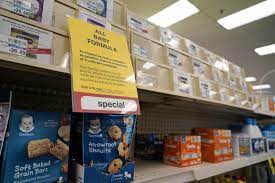FDA chief says baby formula supply is expected to remain short through late July; meanwhile, shortage gets worse in Kentucky

Photo from The Associated Press
—–
By Melissa Patrick
Kentucky Health News
The baby formula shortage continues to worsen in Kentucky, with the state’s out-of-stock rate increasing by 20 percentage points since May 8, according to the retail data firm Datasembly.
Datasembly reports that in the week starting May 15, the latest data available, Kentucky’s out-of-stock rate for baby formula increased to 75%, up from 55% the prior week. That placed Kentucky 26th among the states, with out-of-stock rates ranging from a high of nearly 89% in Utah to a low of 45% in Illinois. The nationwide out-of-stock rate is 70%.
Gov. Andy Beshear said at his May 26 news conference that he could not confirm the data, but said, “Certainly there is a nationwide shortage, which is real concerning.”
Kelly Potts, a spokeswoman for Datasembly, said in an e-mail that their data comes from more than 230 retailers with over 130,000 stores across the U.S., Canada and Mexico, and the out-of-stock (OOS) index only includes U.S. stores.
Beshear encouraged Kentuckians who are part of the Special Supplemental Nutrition Program for Women, Infants and Children, or WIC, to reach out to their WIC provider, which is usually the local health department, if they are struggling to get enough formula. He said those who are not part of the WIC program should reach out to their pediatrician.
WIC is available to Kentucky residents who are pregnant, breastfeeding or have a child 5 or younger and have household income of no more than 185% of the federal poverty level, with rules governing what counts as income. Anyone who receives Medicaid or is part of the Supplemental Nutrition Assistance Program (SNAP, formerly food stamps) automatically meets the income requirements for WIC. Click here for a WIC PreScreening Tool to see if you are eligible for WIC benefits.
According to the state Department for Public Health, Kentucky has about 19,500 infants on WIC who are fully formula-fed in any given month.
The health department said it connects WIC participants with about 350,000 containers of formula per month, accounting for about $2.2 million in WIC benefits per month, just over a third of the total benefits.
The department said redemption of formula since the February recall by major manufacturer Abbott Laboratories has declined by about one-third, from an average utilization rate of about 82% six months before the recall to about 69% in the first quarter of the year.
The agency said it took several actions in response to the recall.
“The Kentucky WIC Program quickly requested and began to execute all waivers available to the states as soon as the U.S. Department of Agriculture provided for them,” Susan Dunlap, spokeswoman for the department, said in an e-mail. “However, that has only been a small part of their response.”
“I went to seven Walmarts — all the Walmarts that are here in Louisville, I went to all of them,” he said. “I went to Target and none of them have any. There is only milk for babies 9 months and older.”
“My expectation is that within two months we should be beyond normal, and with a plethora,” Califf said. “It’s going to be gradual improvement up to probably somewhere around two months until the shelves are replete again.”